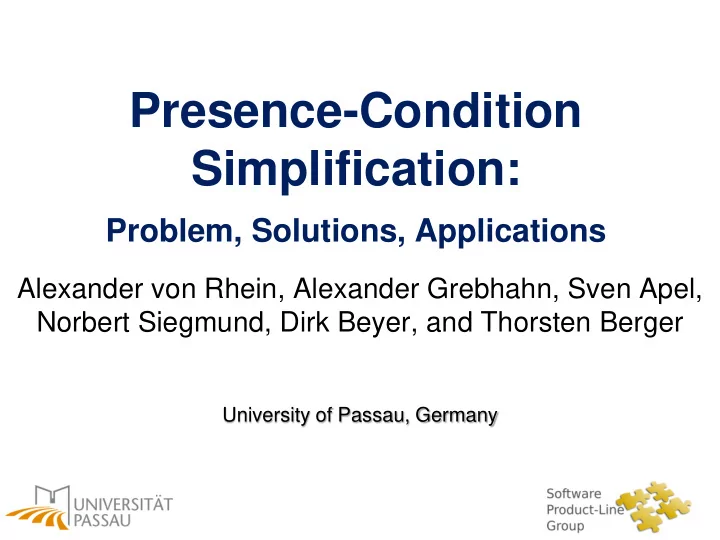

Presence-Condition Simplification: Problem, Solutions, Applications Alexander von Rhein, Alexander Grebhahn, Sven Apel, Norbert Siegmund, Dirk Beyer, and Thorsten Berger University of Passau, Germany
Alexander von Rhein Presence-Condition Simplification Simplification + Thermodynamics + Friction + Turbocharging + … This picture would be Imagine I will speak about much more focused. the pistons in a diesel engine. FOSD meeting 2014 2
Alexander von Rhein Presence-Condition Simplification Presence Conditions In analysis reports Verification Type checking Dataflow analysis In source code #ifdefs In internal code representations Variability-aware AST in TypeChef FOSD meeting 2014 3
Alexander von Rhein Presence-Condition Simplification Presence-Condition Simplification Presence Condition Context VariabilityModel = base ⋀ (decrypt ⇔ encrypt) ⋀ (sign ⇔ verify) ⋀ (encrypt ⇒ keys) ⋀ (sign ⇒ keys) simp (Presence Condition, Context) FOSD meeting 2014 4
Alexander von Rhein Presence-Condition Simplification Scenario 2: Variability Model Synthesis Hierarchy Cross-tree constraints VM synthesis [She, ICSE11] generates models from expressions Problem: eliminating redundant facts from CTC Solution: Presence condition := cross-tree constraints Context := hierarchy constraints FOSD meeting 2014 5
Alexander von Rhein Presence-Condition Simplification Formal Problem Definition Given a presence condition 𝑞 and its context 𝑛 : (both given as boolean expressions) we seek x = simp( 𝑞 , 𝑛 ) such that 1. 𝑛 → (x ≡ 𝑞 ) If 𝑛 holds, we can replace 𝑞 by 𝑦 . 2. 𝑦 should be “smaller” than 𝑞 . We define the size of an expression as the number of its operators. FOSD meeting 2014 6
Alexander von Rhein Presence-Condition Simplification Solutions R ESTRICT (Coudert & Madre, 1989) Based on binary decision diagrams Heuristic to minimize the node count in the BDD DAG traversal / comparison Two-level logic minimization (1980s) Input: an expression and a don’t care set DC DC states for which variable assignments we don’t care about the value of x Our don’t care set is ¬ 𝑛 Q UINE -M C C LUSKEY (1956) E SPRESSO (1986) FOSD meeting 2014 7
Alexander von Rhein Presence-Condition Simplification Experiments E1 “Classification of Variants” Presence conditions from Norbert’s ICSE12 paper E2 “Defect-Location Reporting” Presence conditions from Sven’s ICSE13 paper E3 “Code Simplification” 21 #ifdef projects Almost no condition-simplification potential E4 “AST Simplification” Presence conditions from T YPE C HEF AST for Linux kernel E5 “Scaling” with VM synthesis Generated variability models from SPLOT Models with 20 to 90 options FOSD meeting 2014 8
Alexander von Rhein Presence-Condition Simplification E1 “Classification of Variants” size ( simp 𝑞 , 𝑛 ) ReductionFactor = lower is better size ( p ) FOSD meeting 2014 9
Alexander von Rhein Presence-Condition Simplification E5 “Scaling” Care-set: DNF-clauses needed to express p ∧ 𝑛 and ¬p ∧ 𝑛 Can increase with larger variability models FOSD meeting 2014 10
Alexander von Rhein Presence-Condition Simplification Conclusion Presence-condition simplification has many application scenarios (reporting, code conditions, …) is effective (can make conditions much smaller) is efficient (fast as long as conditions/contexts can be expressed in BDDs) Future work Other application scenarios Specialized algorithms? FOSD meeting 2014 11
Alexander von Rhein Presence-Condition Simplification Christian’s Application? “Order of Feature Interactions” Presence Condition Context Bug-triggering condition (e.g. Linux) Variability model ⋀ other global conditions VariabilityModel = base ⋀ (decrypt ⇔ encrypt) ⋀ (sign ⇔ verify) ⋀ (encrypt ⇒ keys) ⋀ (sign ⇒ keys) simp (Presence Condition, Context) Heuristics! count variables in simplified condition 2 variables left -> 2-way interaction FOSD meeting 2014 12
Recommend
More recommend